 Petzlover
Petzlover Domestic Shorthaired Cat is originated from United States but Norwegian Forest Cat is originated from Norway. Both Domestic Shorthaired Cat and Norwegian Forest Cat are having almost same weight. Domestic Shorthaired Cat may live 4 years more than Norwegian Forest Cat. Both Domestic Shorthaired Cat and Norwegian Forest Cat has same litter size. Domestic Shorthaired Cat requires Low Maintenance. But Norwegian Forest Cat requires Moderate Maintenance
Domestic Shorthaired Cat is originated from United States but Norwegian Forest Cat is originated from Norway. Both Domestic Shorthaired Cat and Norwegian Forest Cat are having almost same weight. Domestic Shorthaired Cat may live 4 years more than Norwegian Forest Cat. Both Domestic Shorthaired Cat and Norwegian Forest Cat has same litter size. Domestic Shorthaired Cat requires Low Maintenance. But Norwegian Forest Cat requires Moderate Maintenance
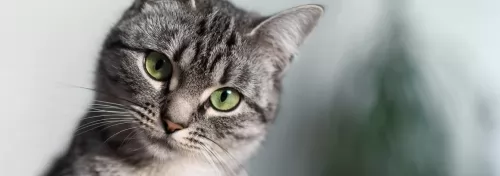 The Domestic short-haired cat has also got mixed ancestry and can have lots of different looks. In the UK they are often referred to as Moggie.
The Domestic short-haired cat has also got mixed ancestry and can have lots of different looks. In the UK they are often referred to as Moggie.
It is one of the most common cats in the United States. The roots of this cat go back to the pioneer settlement in North America where they were thought of as working cats. Nobody seems clear on where they originated from.
Hardy and unaffected, they quickly became a sought after cat that stood up well to all kinds of conditions. Even though this cat is a non-pedigreed cat, it is accepted by the Cat Fanciers' Association (CFA) in the Household Pets category.
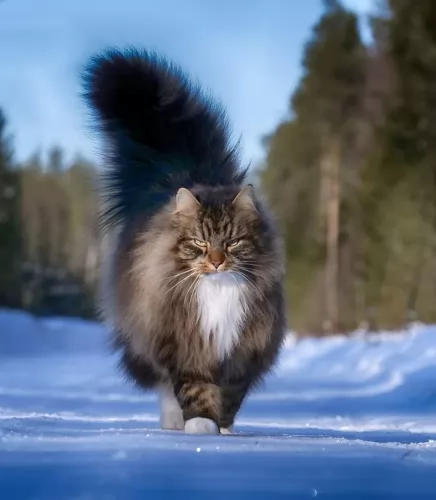 The beautiful Norwegian Forest cat has a thick fur to survive the snow and icy weather in Norway. It is the official cat of Norway.
The beautiful Norwegian Forest cat has a thick fur to survive the snow and icy weather in Norway. It is the official cat of Norway.
It originated in Northern Europe. It is believed that the cat was brought to Norway from Great Britain way back in the time of the Vikings. It is also believed that it reproduced with farm cats and has become the modern-day Norwegian Forest breed.
They were discovered in the early twentieth century by cat enthusiasts and in 1938 an organization was established devoted to this breed.
Also, a club was started for the cat in Oslo so as to preserve the breed. The 2nd World War saw the cat all but disappear but a breeding program was started. It was registered in Europe by the 1970s, and in 1994 by the American Cat Fanciers Association and others.
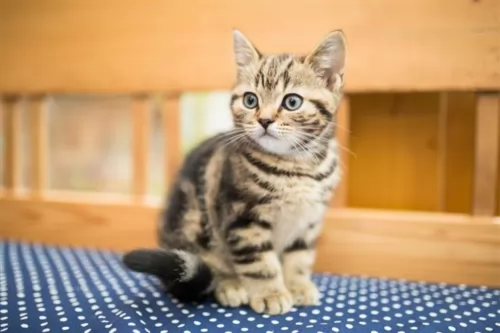 The Domestic short-haired cats can be so many things – different coat colors and different patterns as well as being different shapes and sizes.
The Domestic short-haired cats can be so many things – different coat colors and different patterns as well as being different shapes and sizes.
They can all have different shaped eyes and colors and their ears and tails can differ from cat to cat. The reason for this is that these cats don’t belong to a specific breed.
It has a mixed ancestral history. The Domestic Shorthaired varies in colors and size and their coats can be any color, solid or patterned. The length of the coat is short and is silky and shiny.
It’s a low shedding cat and grooming will be easy. Every cat has its own physical characteristics, and some can have a slight build while others are heavier built and more muscular.
You could find their eyes can be different colors too – blue, green, copper or brown.
Just like the Domestic Shorthair has lots of different looks, the temperament too varies. There is no set standard for these cats and when you choose a kitten, you can’t really be sure how they will turn out.
Your cat may be quiet, very vocal, active, placid, loyal loving, independent, playful or lazy – who knows with these wonderful cats?
Certainly, most of them are friendly, loving and loyal. They make wonderful pets for new cat owners, singles, couples, families and seniors.
People love them as they aren’t high maintenance pets – they are undemanding.
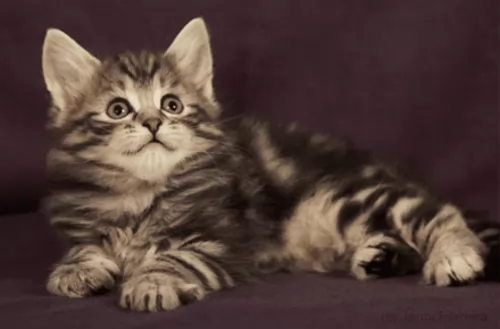 This domestic cat is a natural breed with a thick coat of long water-resistant fur and a woolly undercoat. The coat can be in many colors and patterns.
This domestic cat is a natural breed with a thick coat of long water-resistant fur and a woolly undercoat. The coat can be in many colors and patterns.
This is a big, strong, heavy boned cat with a bushy tail and long legs. It’s larger than your regular cat and can weigh anything between 3 and 9kg. The eyes are almond-shaped and can be any color while the large ears are high set.
In spite of this being a large cat, they are energetic and yet they don’t like being around boisterous, energetic pets. They are friendly, calm, gentle, and intelligent and enjoy being part of a human family.
They tend to be a bit reserved around strangers. It’s not a demanding cat and can entertain himself with his toys.
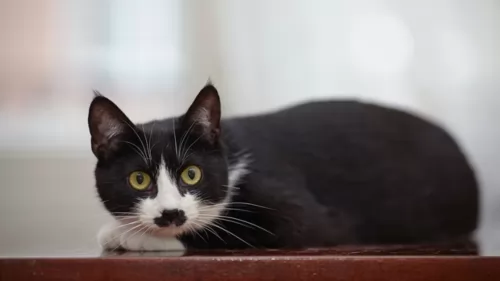 As we’ve already suggested, the Domestic Shorthaired has an easy-going personality, not demanding much from you except nutritious food and lots of love and attention.
As we’ve already suggested, the Domestic Shorthaired has an easy-going personality, not demanding much from you except nutritious food and lots of love and attention.
It’s important to provide your cat with a lifestyle that keeps him happy and content.
Rather than buy your pets lots of expensive cat accessories, your cat will be happier to do with less but to have more attention from you. This cat is willing to give you so much love and companionship ad he asks the same from you.
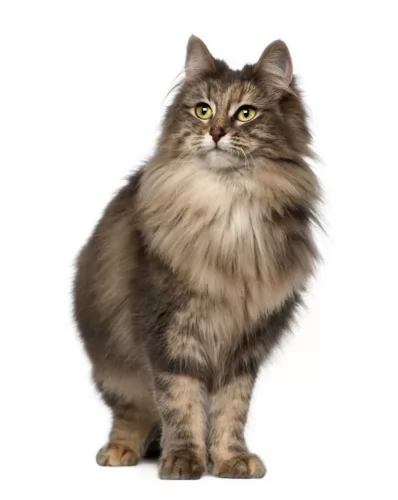 Remember that your large Norwegian Forest cat likes to scratch so you want to provide him with a scratching post. He is so companionable, you want to reward him by ensuring you make his life as easy as possible.
Remember that your large Norwegian Forest cat likes to scratch so you want to provide him with a scratching post. He is so companionable, you want to reward him by ensuring you make his life as easy as possible.
Known as a gentle giant, the beautiful and undemanding Norwegian Forest cat will appreciate a calm household where he can quietly enjoy the companionship of the humans he loves.
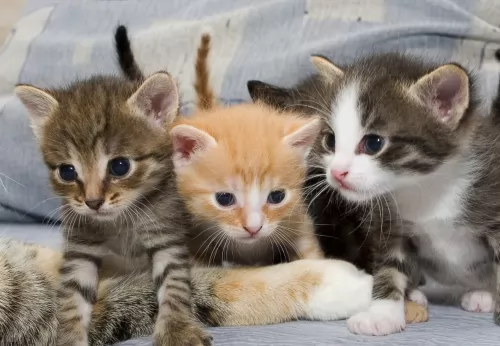 Because of their mixed breed, these Domestic Shorthaired cats don’t sicken easily and they are healthy cats and robust – less vulnerable to the genetic problems that plague purebred cats.
Because of their mixed breed, these Domestic Shorthaired cats don’t sicken easily and they are healthy cats and robust – less vulnerable to the genetic problems that plague purebred cats.
Nonetheless, he can succumb to illness and then you need to get him to the vet immediately. There are come cat illnesses that can kill your cat in just a few hours. Look at bloat as an example – this is when your cat’s stomach becomes swollen and your pet is weak and vomiting. It’s a life-threatening condition that can kill your cat in half an hour,
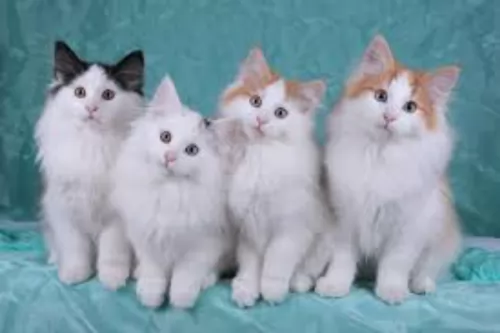 The lifespan of this big, longhaired cat is usually 14 to 16 years, but you need to check out kidney and heart disease with this particular breed as well as patellar luxation.
The lifespan of this big, longhaired cat is usually 14 to 16 years, but you need to check out kidney and heart disease with this particular breed as well as patellar luxation.
You don’t want your cat having problems with the knee cap as this takes away from his ability to leap, pounce and crouch. It’s when the patella or kneecap is out of place. There may not necessarily be pain for your pet and in fact, your cat may not show any signs of abnormality till the condition has become quite advanced.
Your cat can actually become lame. You want to avoid this with the Norwegian as it's a particularly good climber.
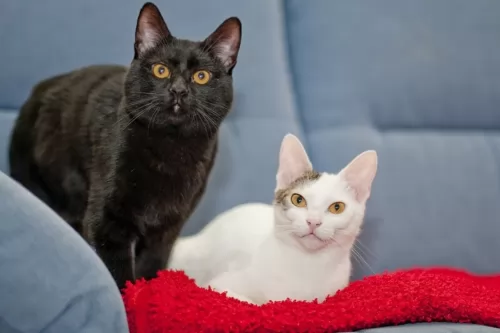 Just like you prepare for a human baby’s arrival, prepare for your Domestic Shorthaired’ arrival.
Just like you prepare for a human baby’s arrival, prepare for your Domestic Shorthaired’ arrival.
Have food and water bowls, a nice, dry, warm bed, toys to stimulate mind and body, litter box, scratching post, climbing tree and collar.
Have your cat neutered or spayed. This is to avoid unwanted kittens. You’ll often see these cats in animal shelters and you don’t want to add to the burden of these shelters. By neutering and spaying your cat, they behave in a better way. They are far less likely to want to roam away from home as well. A cat that have been neutered or spayed also enjoys a host of health benefits, and this common surgical operation is highly recommended.
Food for your cat is very important for good health. Do research and you’ll discover how imperative good gut-health is. A poor diet and the wrong diet can cause your cat to battle with a lot of poor health issues and digestive problems.
You’ll end up spending a fortune on your cat’s vet bills. A cat is a carnivore and it is most important to feed your cat meat. Check out the labels on the cat’s commercially manufactured food and choose the ones that make meat a top ingredient.
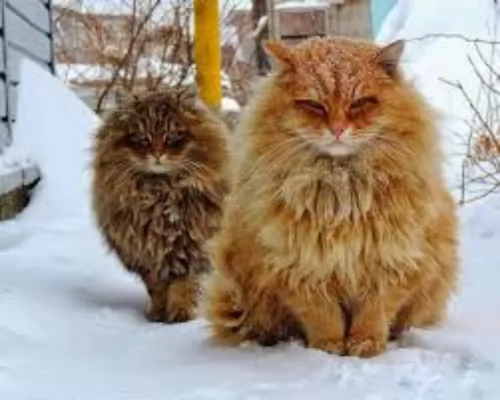 The Norwegian has a long coat so you will need to brush it at least twice a week to keep it nice and shiny and free from tangles.
The Norwegian has a long coat so you will need to brush it at least twice a week to keep it nice and shiny and free from tangles.
Trim your Norwegian forest cat’s claws. You will need a special nail clipper, but if you're nervous to cut the nails yourself, your vet or pet groomers can do it for you.
Cats battle quite a bit with periodontal disease and an excellent diet can help to prevent this. Cats hate you sticking a toothbrush into their mouths – they can become terrified - and it would b kinder to simply have your cat’s teeth checked out at the vet when you suspect that something might be wrong. At the same time, you can ask to have the inside of your cat’s ears checked for dirt and infection.
Keep your cat’s litter box spotlessly clean. These cats dislike a dirty litter box intensely. Remove all feces every single day – more often even if possible.
One good way to select the best food for your cat is to read the ingredients. The first two ingredients listed on the package should always be meat. Select a high-quality cat food. Keeping Norwegian Forest cats in good health requires high-quality cat food to meet all of your Norwegian forest cat’s nutritional needs.
You can feed your Norwegian Forest cat two meals per day. Always check with your veterinarian for a recommendation on how much and what to feed your cat.
Provide a constant supply of fresh, clean water for your Norwegian Forest cat.The bowl should be in an easy place for your cat to reach and in the shade.
Provide your Norwegian with a soft bed in a quiet, restful place.